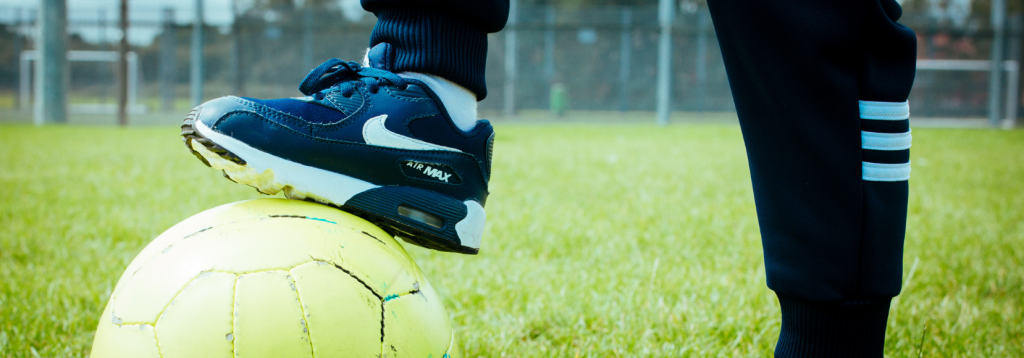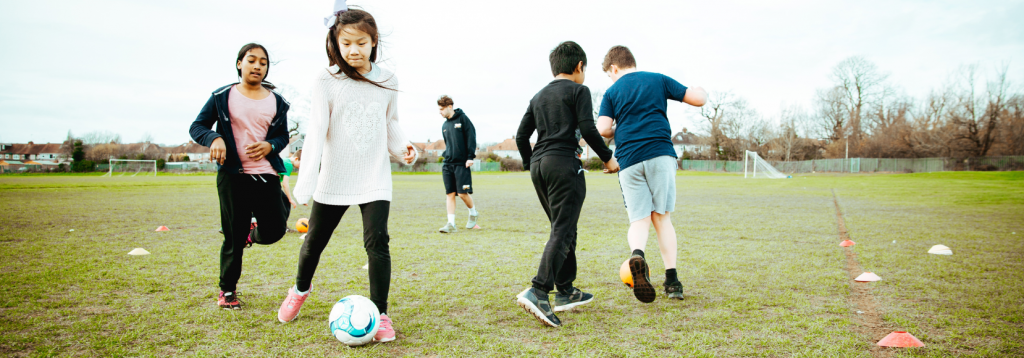Top 6 football games for kids to include in your PE lessons
Football – or soccer – is widely considered to be the most popular sport in the world in terms of global participation, viewership and fan base.
It’s not hard to see why – it requires minimal resources, anyone can have a go, and it can get very exciting! And, with the UEFA European Championship and Olympics just around the corner, fans have got plenty to look forward to.
It’s likely that football games for kids regularly form part of your PE lesson plans at school, and this isn’t surprising considering its popularity. However, you may be stuck in a rut, or even find it challenging to inspire those who aren’t so keen on football.
If you find that girls show less interest in the sport, why not check out our report on how we can support and encourage more girls to play football?
So let’s take a deep dive into why football is such a great game for all primary year groups, as well as some fun football games to get little ones involved and having fun.
The benefits of football
Physical fitness
Football and associated games are excellent cardiovascular activities that get the heart pumping, improving overall fitness. They promote endurance, strength, flexibility, and coordination due to players having to run, dribble and kick the ball.
Teamwork and cooperation
As a team sport, playing a football game means children learn to work together with other players towards a common goal (scoring goals!), teaching them teamwork and the importance of collective effort.
Social skills
Playing a football game provides opportunities for kids to interact with their peers, teachers and teammates. They learn communication, teamwork and sportsmanship, which are essential social skills that can be applied in various aspects of life.
Problem-solving skills
Football often involves quick decision-making on the field. Players need to assess the situation, anticipate opponents’ moves, and make split-second decisions. This enhances cognitive abilities and key skills like problem-solving on and off the football pitch.
Confidence building
Success and improvement in football can boost a child’s confidence no end. Mastering new skills, scoring goals, and contributing to the team’s success instil a sense of accomplishment and self-esteem.
6 fun football games
Yes, football might be a simple game in itself, but having some fun football games for kids up your sleeve doesn’t hurt. It helps to keep lessons fresh and kids engaged, and it also makes teaching the game more interesting for you!
Football golf game
A fun blend of sports, this challenge will get children to practise ball control and accuracy. Set up the ‘golf course’ by using hoops (or similar) as your holes.
Mark out starting points for each hole and then see if the children can land the ball in the hoop using as few kicks as possible.
An extra challenge could be to add in obstacles (‘bunkers’) to really test their kicking ability.
Good for: Kicking, control.
Bouncing and dribbling game
Start by dividing the class into pairs. Each pair has a ‘bouncer’ and a ‘dribbler’. The bouncer has a ball in their hands and as the dribbler is dribbling the ball, the bouncer’s aim is to bounce the ball to knock the ball from the dribbler’s feet.
If this happens, the roles switch. The dribbler has to use close control of the ball as well as shielding skills to try and keep hold of it. This is a great warm-up challenge.
Good for: Agility, ball control and learning to use the upper body to shield.
Musical chairs game
A very similar game to the traditional party game of musical chairs, this game replaces the chairs with balls! Place the balls in the centre of the space, but make sure there is one less ball than the number of children.
The kids will no doubt enjoy listening to some tunes as they make their way around the space. As soon as the music stops, they must grab a ball. The player without a ball is out. Continue until there is only one child left.
Good for: Testing quick reactions, speed.
Aliens game
One pupil starts as the ‘alien’ while the other children find a space. The alien is the only one with a ball and while the other children run around, the player kicks the ball gently against the other kids’ legs in order to ‘zap’ them.
The rules of this game state that the ball must not go above knee height. If a person is ‘zapped’, they grab a ball and also become an alien.
Good for: Accuracy of passing, agility, changing directions.
In a spin game
This is one for the summer when you’re out on the school field! It’s guaranteed to bring a smile to the face of even the most football-averse child.
Have your class line up in front of a goal, and taking it in turns, each child must spin slowly three times before attempting to shoot the ball in the net. How accurate can they be when they are off-balance?
Good for: Balance, target practice.
First to the ball game
Set up by splitting the class into two teams, with each lining up behind the ‘corner flags’ on the pitch you’ve created.
Place two cones in front of the goal, a few metres back, and about one metre apart. Put the ball in the middle, in between the cones and the goal.
When the teacher shouts ‘go’, one player from each team races from their starting point, around the cone, and tries to beat their opponent to the ball to take a shot. Award one point for every goal scored.
Good for: Speed, accuracy, shooting skill.
For more activities relating to the beautiful game, check out another of our blogs, found here.
Enhance your PE lesson plans with Premier Education
If your lesson plans are tired and could do with an injection of expertise, look no further. Our curricular support provides engaging lesson plans and schemes of work to help you deliver the PE curriculum in the best way possible while ensuring your pupils have fun.
No matter what PE resources you have at your school, we can work with you to make the most of your equipment. We help you to create fun lessons, with your time spent teaching and not planning.
And, if the kids at your school want more opportunities to play this fantastic sport, why not look at our extracurricular clubs? Our highly trained activity professionals teach six-week courses which not only supplement the more classic sports such as football but bring new sports to children at your school.







